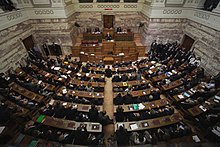Greek Senate
The Senate, seen as a reactionary body and essentially dependent upon the King, was abolished by the Greek Constitution of 1864.On 2 January 1924, the Fourth National Assembly convened and decided the abrogation of the dynasty as well as the abolition of the crowned democracy (a decision which was ratified by referendum on 13 April 1924), establishing the Second Hellenic Republic.The Chamber was made up of 200-300 members elected for a four-year term by direct, secret and universal ballot.For the first time, the Greek Constitution included a clause stating that the Cabinet must "enjoy the confidence of the Parliament".During most of its history it was housed at the Palace of St. Michael and St. George in Corfu, where its meeting room can still be seen with the original furniture.

Byzantine senateUpper HouseHellenic ParliamentOld Royal PalaceAthensPolitics of GreeceConstitutionConstitutional historyHuman rightsExecutivePresident of the RepublicKaterina SakellaropoulouPresidential DepartmentsGovernmentPrime MinisterKyriakos MitsotakisCabinetKyr. Mitsotakis IILegislaturePresidentKonstantinos TasoulasConference of PresidentsParliamentary committeesConstituenciesApportionmentJudiciarySpecial Highest CourtCourt of CassationCouncil of StateChamber of AccountsSubdivisionsRegionsMunicipalitiesElectionsPolitical partiesParliamentary2023 (May)2023 (June)EuropeanForeign relationsMinistry for Foreign AffairsMinisterGiorgos GerapetritisDiplomatic missions of GreeceDiplomatic missions in GreecePassportVisa requirementsPolitics of the European UnionromanizedGerousíaparliamentGreeceGreek War of IndependenceSenate of Western Continental GreeceAreopagus of Eastern Continental GreecePeloponnesian SenateGreek Senate (1829)Fourth National Assembly at ArgosPanellinionIoannis KapodistriasGeorgios SisinisFifth National Assembly at NafplionGreek Constitution of 1844Greek Constitution of 1864referendumSecond Hellenic RepublicTheodoros PangalosConstitution of 1927failed coupGeorgios KondylisConstitution of 1911George IIIonian SenatePalace of St. Michael and St. GeorgeKingdom of GreeceSeptinsular RepublicUnited States of the Ionian IslandsLefkadaKefaloniaZakynthosIthacaKythiraHarvard University PressUpper houseslegislaturesFederalArgentinaAustraliaAustriaBelgiumBosnia and HerzegovinaBrazilCanadaEthiopiaGermanyMalaysiaMexicoNigeriaPakistanRussiaSomaliaSouth SudanSwitzerlandUnited StatesUnitaryAlgeriaAntigua and BarbudaBahrainBarbadosBelarusBelizeBhutanBoliviaBurundiCambodiaCameroonColombiaDemocratic Republic of the CongoRepublic of the CongoCzech RepublicDominican RepublicEquatorial GuineaEswatiniFranceGrenadaIndonesia